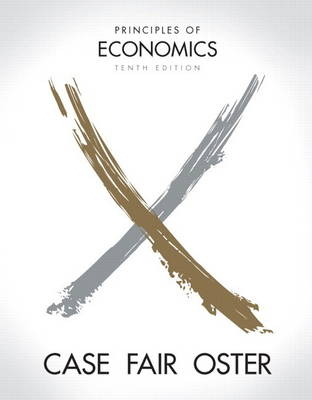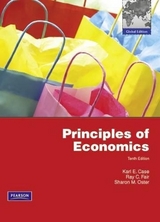
Principles of Economics plus MyEconLab with Pearson Etext Student Access Code Card Package
Prentice Hall (Hersteller)
978-0-13-274485-0 (ISBN)
- Titel erscheint in neuer Auflage
- Artikel merken
Karl E. Case is Professor of Economics Emeritus at Wellesley College where he has taught for 34 years and served several tours of duty as Department Chair. He is a Senior Fellow at the Joint Center for Housing Studies at Harvard University and a founding partner in the real estate research firm of Fiserv Case Shiller Weiss, which produces the S&P Case-Shiller Index of home prices.He serves as a member of the Index Advisory Committee of Standard and Poor’s, and along with Ray Fair he serves on the Academic Advisory Board of the Federal Reserve Bank of Boston. Before coming to Wellesley, he served as Head Tutor in Economics (director of undergraduate studies) at Harvard, where he won the Allyn Young Teaching Prize.He was Associate Editor of the Journal of Economic Perspectives and the Journal of Economic Education, and he was a member of the AEA’s Committee on Economic Education. Professor Case received his B.A. from Miami University in 1968; spent three years on active duty in the Army, and received his Ph.D. in Economics from Harvard University in 1976. Professor Case’s research has been in the areas of real estate, housing, and public finance. He is author or coauthor of five books, including Principles of Economics, Economics and Tax Policy, and Property Taxation: The Need for Reform, and he has published numerous articles in professional journals. For the last 25 years, his research has focused on real estate markets and prices.He has authored numerous professional articles, many of which attempt to isolate the causes and consequences of boom and bust cycles and their relationship to regional and national economic performance. Ray C. Fair is Professor of Economics at Yale University. He is a member of the Cowles Foundation at Yale and a Fellow of the Econometric Society. He received a B.A. in Economics from Fresno State College in 1964 and a Ph.D. in Economics from MIT in 1968. He taught at Princeton University from 1968 to 1974 and has been at Yale since 1974. Professor Fair’s research has primarily been in the areas of macroeconomics and econometrics, with particular emphasis on macroeconometric model building.He also has done work in the areas of finance, voting behavior, and aging in sports. His publications include Specification, Estimation, and Analysis of Macroeconometric Models (Harvard Press, 1984); Testing Macroeconometric Models (Harvard Press, 1994); and Estimating How the Macroeconomy Works (Harvard Press, 2004). Professor Fair has taught introductory and intermediate macroeconomics at Yale. He has also taught graduate courses in macroeconomic theory and macroeconometrics. Professor Fair’s U.S. and multicountry models are available for use on the Internet free of charge. The address is http://fairmodel.econ.yale.edu.Many teachers have found that having students work with the U.S. model on the Internet is a useful complement to an introductory macroeconomics course. Sharon M. Oster is the Dean of the Yale School of Management, where she is also the Frederic Wolfe Professor of Economics and Management. Professor Oster joined Case and Fair as a coauthor in the ninth edition of this book. Professor Oster has a B.A. in Economics from Hofstra University and a Ph.D. in Economics from Harvard University. Professor Oster’s research is in the area of industrial organization. She has worked on problems of diffusion of innovation in a number of different industries, on the effect of regulations on business, and on competitive strategy. She has published a number of articles in these areas and is the author of several books, including Modern Competitive Analysis and The Strategic Management of Nonprofits. Prior to joining the School of Management at Yale, Professor Oster taught for a number of years in Yale’s Department of Economics. In the department, Professor Oster taught introductory and intermediate microeconomics to undergraduates as well as several graduate courses in industrial organization. Since 1982, Professor Oster has taught primarily in the Management School, where she teaches the core microeconomics class for MBA students and a course in the area of competitive strategy. Professor Oster also consults widely for businesses and nonprofit organizations and has served on the boards of several publicly traded companies and nonprofit organizations.
Brief Table of Contents
PART I Introduction to Economics
1
The Scope and Method of Economics
2 The Economic Problem: Scarcity and Choice
3 Demand, Supply, and Market Equilibrium
4 Demand and Supply Applications
5 Elasticity
PART II The Market System: Choices Made by Households and Firms
6 Household Behavior and Consumer Choice
7 The Production Process: The Behavior of Profit-Maximizing Firms
8 Short-Run Costs and Output Decisions
9 Long-Run Costs and Output Decisions
10 Input Demand: The Labor and Land Markets
11 Input Demand: The Capital Market and the Investment Decision
12 General Equilibrium and the Efficiency of Perfect Competition
PART III Market Imperfections and the Role of Government
13 Monopoly and Antitrust Policy
14 Oligopoly
15 Monopolistic Competition
16 Externalities, Public Goods, and Social Choice
17 Uncertainty and Asymmetric Information
18 Income Distribution and Poverty
19 Public Finance: The Economics of Taxation
PART IV Concepts and Problems in Macroeconomics
20 Introduction to Macroeconomics
21 Measuring National Output and National Income
22 Unemployment, Inflation, and Long-Run Growth
PART V The Core of Macroeconomic Theory
23 Aggregate Expenditure and Equilibrium Output
24 The Government and Fiscal Policy
25 The Money Supply and the Federal Reserve System
26 Money Demand and the Equilibrium Interest Rate
27 Aggregate Demand in the Goods and Money Markets
28 Aggregate Supply and the Equilibrium Price Level
29 The Labor Market In the Macroeconomy
PART VI Further Macroeconomics Issues
30 Financial Crises, Stabilization, and Deficits
31 Household and Firm Behavior in the Macroeconomy: A Further Look
32 Long-Run Growth
33 Alternative Views in Macroeconomics
PART VII The World Economy
34 International Trade, Comparative Advantage, and Protectionism
35 Open-Economy Macroeconomics: The Balance of Payments and Exchange Rates
36 Economic Growth in Developing and Transitional Economies
| Erscheint lt. Verlag | 28.2.2011 |
|---|---|
| Verlagsort | Upper Saddle River |
| Sprache | englisch |
| Themenwelt | Wirtschaft ► Volkswirtschaftslehre |
| ISBN-10 | 0-13-274485-6 / 0132744856 |
| ISBN-13 | 978-0-13-274485-0 / 9780132744850 |
| Zustand | Neuware |
| Informationen gemäß Produktsicherheitsverordnung (GPSR) | |
| Haben Sie eine Frage zum Produkt? |
